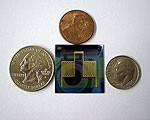Tiny Sensor Detects Strokes During Heart Surgery
 Nov-24-13
The discovery of a protein that serves as a biomarker for brain injuries has led to the creation of the world’s most sensitive organic thin film sensor—and a new way to detect brain injury during heart surgery.
Nov-24-13
The discovery of a protein that serves as a biomarker for brain injuries has led to the creation of the world’s most sensitive organic thin film sensor—and a new way to detect brain injury during heart surgery.Although brain injury can occur during heart surgery in patients of all ages, the biosensor was developed specifically with young patients in mind. Many children with congenital heart defects require a series of operations throughout their lives, and pediatric cardiologist Dr. Allen D. Everett noticed the neurodevelopment problems that would occur as a result of the repeated surgeries.
To address the issue, he used an organic thin film transistor as the platform for a sensor able to detect glial fibrillary acidic protein (GFAP), a biomarker for brain injury. The detector is extremely sensitive to the protein, and can alert the medical team to the occurrence of a stroke, allowing them to take immediate measures. The sensor could also eventually be used at sporting events to detect concussions in athletes.
More Info about this Invention:
[MEDGADGET.COM][JOHNS HOPKINS]

Add Your Comment